#about prophecy and how that relates to This World Here
Note
obviously if you’re busy leave this alone but: your tag essay has made me VERY intrigued about Dess and Azzy’s relationship in this AU. Tell me about it?
(also, did you see they did an announcement about Starship Iris season 3? It’s finally gonna happen!)
okay IM HERE TO TALK LOL i will NEVER not talk about this au <3 uhhh under a cut bc. really i should just expect these get super long.
big important note up top: all of this is in! early stages! things are not fully formed and researched yet so please keep that in mind as you read this. ideas might change and will get deeper as i do more work for this au, but since rn im focusing on owl house most of these are my ideas i've had without time to do deeper dives into them.
okay so with asriel i've always sort of written him as this guy who like...has an idea of what is 'normal' in his head, ie, what society wants from people, and what it doesnt want, and he has tried his hardest his entire life to always fit into this box. (think about i know im not well--this is why he's always seen kris as a human. being nonhuman is abnormal and gets you punished in society. to an extent this is also how he views dess being aromantic.)
i think a lot of this comes from fear--asriel IS for sure contorting himself and actively harming himself to stay inside this narrow box of 'normal' (think of this as another sort of prophecy--these are all touching on the same themes). and he applies this same mentality to other people BECAUSE of this fear, because he doesnt want his loved ones to be hurt, to be punished, ostracized, etc by society--which are i wanna be clear VERY MUCH THINGS THAT HAPPEN--but in doing this he sort of just hurts the people he loves. because instead of being someone who rejects these boxes hes like. no we gotta be good and fit into the boxes and then everything will be okay.
so when it comes to dess, dess has always very much Done Her Own Thing, consequences be damned. partly this is who she is, partly this is hashtag undiagnosed and untreated mental illness, the onset of which happens around when shes 18 and everything is going down with the bunker (which is NOT helping at ALL). and so when dess comes back from the bunker asriel does very much go 'oh. shes delusional.' and proceed to be No Help At All.
and like, the thing is dess IS very much having a psychotic break. this bit is very much still in deep research (sidenote: anybody in my audience who has experience w/ these things. feel free to hit me up/dm me lol i'd love to talk through some of my ideas as a sort of preliminary sensitivity read, but of course only do this if you are up to it, no pressure lol bc again we're in early stages) but she has schizoaffective + bipolar disorder. dark worlds dont help with this, asriel SUPER doesnt help with this (he doesnt know her actual disorder--neither of them do, this is the onset of things. but tbf even if he did he Would Not Help asriel is essentially doing everything wrong here.) and what dess needs is literally one single person in her corner but the person who is supposed to be in her corner (azzy) is basically being like 'you are making this up' and shes like im NOT, and everything is all mixed together, terrible, bad, awful, and eventually everything culminates and. we know what happens.
(side note but this is why she and chara work real well together actually--chara gets her when asriel doesnt!!)
asriel never actually like. tells anybody about this though. in his head after its assumed dess and kris have died he sort of just. is like well this proves it. i cant let anybody else i care about go that far EVER AGAIN, because if i was a better friend i would've noticed and i wouldve stopped it and made dess "normal." (yes asriel sucks here. the focus is on the kids but. he's getting an arc. i do promise he will get better but. that doesnt really fix what he's done in the past.)
and all of this is like. it fucking sucks for the people around asriel. in hurting himself he's hurting his loved ones--it pushes dess away, and that relationship is never going to be the same. even when asriel realizes how he fucked up i dont think dess really forgives him. because if asriel had just believed her, or at least even if he didnt actually took her seriously and tried to help, shes like. things wouldve gone differently. and asriel knows this too.
and then when it comes to NOELLE, well. asriel's always been very overprotective of her. terrified the world is going to hurt her. and so when noelle starts experiencing things, things she cant tell if theyre real or not...
she doesnt tell him. she doesnt tell anybody. she keeps it all to herself, and this means its a hell of a lot easier for the player/red soul to manipulate her. and nobody finds out until its too late.
#ask#drkau#hi welcome to the reveal of a real big thing this au is about that i havent mentioned anywhere yet <3#unless youre one of two people in which case hey. hey guys.#but yeah uh. ive had some thoughts. about what i want to do. try to say.#about prophecy and how that relates to This World Here#and yes the only place i can say those things is in a deltarune au <3 i love my life#also STARSHIP IRIS S3 YES. I SAW. SO EXCITED.#also also. writing this it hit me that holy shit asriel is the monster in 'human monster prince from the dark' isnt he. fuck. god.#GOD BC. if this is all tying back into prophecy...we get the red soul upholding it...azzy upholding it..and ralsei who was supposed to#but shes the one who BREAKS IT. oh my god. okay lemme write this down love having banger ideas in the tags
7 notes
·
View notes
Text
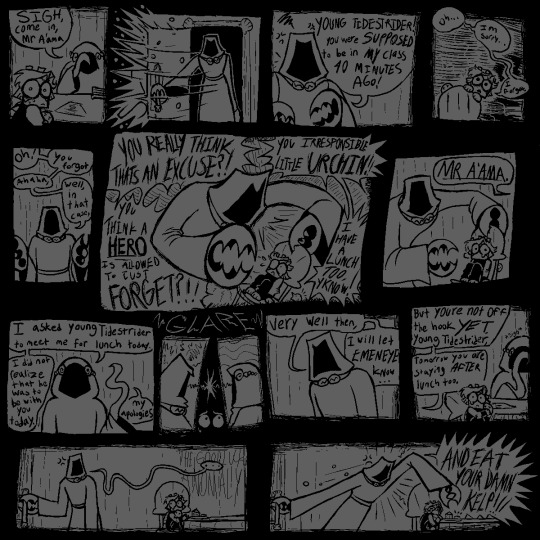
[<==PREV PAGES] [NEXT PAGE==>(not out yet.wait a year.or maybe more.imagine.]
saw alot of comments on prev pages; saying 'i HATE that mean teacher! im gonna FIGHT HIM!!' & i LOVE the energy!! it WOULD be nice. to have that catharsis. but the story of young tidestrider is Not one of catharsis. it is a story of being so small and so special and sucking so bad.
#jrwi fanart#jrwi show#jrwi riptide#gillion tidestrider#GONNA START FORMATTING MY COMICS BETTER. W THE PROPER 'PREV' 'NEXT' LINKS#REALLY DIDNT EXPECT TO CONTINUE THIS SERIES BUT AAAUUUHH MY BRRAAAIN MY BRAIN IS SO IDEASSS. I HAVE 3 OTHER PAGES SKETCHED OUT#NO PROMISES ILL FINISH EM ANY TIME SOON OR EVER. MY WHIMS ARE THEIR OWN BEAST AND I ONLY DRAW ON MY WHIMS#THAT BEING SAID IF U COMMISSIONED ME ILL GEEETT TO YOUUU IM SORRYYYY. ART IS AN EMOTIONAL RELEASE FOR ME N BABY I HAVE EMOTIONS.#ESPECIALLY ABOUT GILLION TIDESTRIDER CHAMPION OF THE UNDERSEA HERO OF THE DEEP.for the desc here i put smth that i typed up in the tags of#another thing i made. i gotta make a proper Baby Gillion tag or smth. eventually.. eventually...I LOVE DRAWIN THIS LIL BABY GUY..#i also LOVE depicting the teachers as just being so fuckin mean. ofc theres variation in that. just like in all things.like the teacher her#idk if itll be mentioned but the octo lady is named Ms Octburn.an octopus pun based off the name of an actual councilor i had#when i was in elementary school i got bullied alot but teachers never did anything. i hated adults and didnt trust them.#but this councilor o mine was so genuinely sweet. i remember spending alot of time w her. she doesnt work there anymore.#but that one school adult that actually earns ur trust and is there for you when they can be.its SO important for a child i think#i hope she knows how much she helped me.youll see in the next page that ms octburn isnt perfect either.but she tries. they all try.somehow.#ALL these comics are gonna be inspired by somesorta experience o mine in the school system. school is so fucked up u ever thing abt that#AND GILLIOOOOONNN IN THE MOST FUCKED UP LITTLE SCHOOL OF ALL. MAINTAINED BY A CULT. CENTERED AROUND HIM. OUR CHOSEN ONE#I IMAGINE ALOT BANKS ON HIS SUCCESS. THIS IS THE WORLD. THE WHOLE WORLD. THE PROPHECY IS GOING TO COME TRUE N UR TELLIN ME#THAT ITS THIS LITTLE IDIOT THATS GONNA BE SAVING US? WHAT IF HE FAILS. IF HE CANT GET THIS RIGHT THEN HE WILL FAIL AND WE WILL DIE#WE NEED TO TRAIN HIM. WE NEED HIM TO LEARN. AND TO SUCCEED. OR ELSE WE'RE DEAD. WE'RE ALL FUCKING DEAD. I IMAGINE THAT MUST BE STRESSFUL#in other news i hope ppl actually giggle when they read these. they ARE intended to be comical. dark humor or whatever. like its also sad#this is intended to be a sad comic series. but a funny one too. does that make sense? god i hope so.saw some1 say they had flashbacks-#-reading this. like YES!! THE INTENDED EFFECT!! YOU GET ME!! i love seeing ppl get upset on this lil baby boys behalf. i LOVE seeing ppl-#-wail n weep n cry in the comments. i LOOOVE seeing ppl RELATE to baby gillion. and i love letting u all know that this wont be a happycomi#gillion gets his happiness arc in the actual show. this series is one of unfortunate events. teehehehe. do u guys remember that show#i keep listening to the lil songs from A Series of Unfortunate Events for inspiration. GOOD STUFF!!#anyway uuhh uhh thats all i got in my brain. for now. feed me ur comments give me ur input i NNEEEEEDD THHEEEMMMM
133 notes
·
View notes
Text
Law's artist side isn't talked about enough, so here's a smooth brain ramble.
He prefers abstract arts over realism. Unlike Kid who forms animal or skull figures with metals, Law creates strange 'sculptures' with his victim's bodies/belongings:
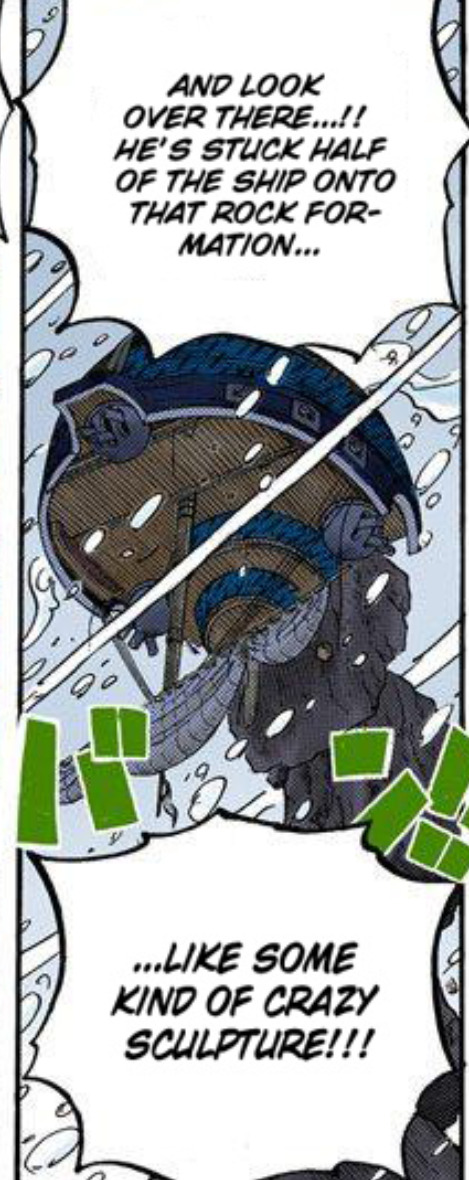

And, of course, the tattoos.
I like how all of his tattoos accentuate the shapes of his torso and arms, especially the joints and muscles. Combined they look like a single stylized drawing of human upper torso.
Seen theories that the tribal style could be a lost trend from Flevance (as seen on the arm of a miner in his flashback), but it could just be his personal style. That said, his upper arm's heart tattoos look similar.
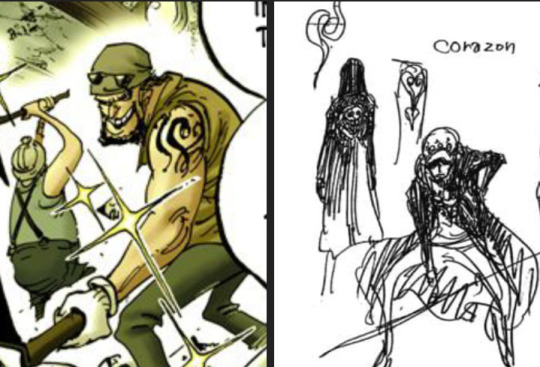
(Something that artists probably noticed long ago but I'm only noticing recently: Law's upper arm's tattoos have been simplified over time. There used to be two spiral-like protrusions, but Oda has been omitting them in later arts)
The "DEATH" tattoos have a straightforward message. According to the Law novel, these were his first tattoos.

Speaking of death, ghosts and spirituality have been implicitly a theme for Law, especially during Dressrosa. Doflamingo referred to Law as Cora's 'vengeful ghost'. Law's (cursed) sword Kikoku's name means 'wailings of a restless ghost". Ironically, Law having a hidden name was also a tradition that related to dead people.
The orange jolly roger (red in the sail) could be many things, I think it's a stylized way of drawing the sun.
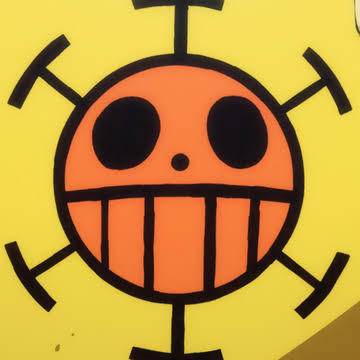
Sun symbols are everywhere in the One Piece world. Law's lower arm tattoos are different types of 'suns'. Law might've subconsciously carried those symbols from his hometown for their aesthetic appeal.
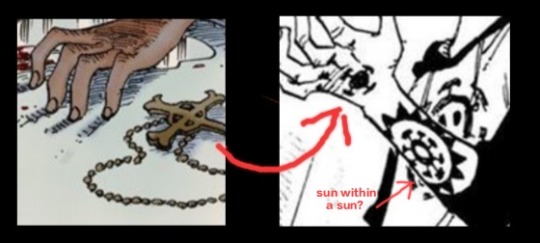
The tattoos on the back of his hands reminded me of the church lady's cross, which is slightly different from the cross seen at Kuma's church. It's possible that various faiths in One Piece world are interconnected, leading to a prophecy about the sun god and Dawn. Law, at the very least, believes in the will of D and his own fate being tied to a purpose.
The chest tattoo, clearly a tribute to Corazon, could have some elements of catholicism. Kikoku also has crosses all over its sheath. Originally this wasn't my observation, but Law seeing Cora as a sacred being makes a lot of sense.
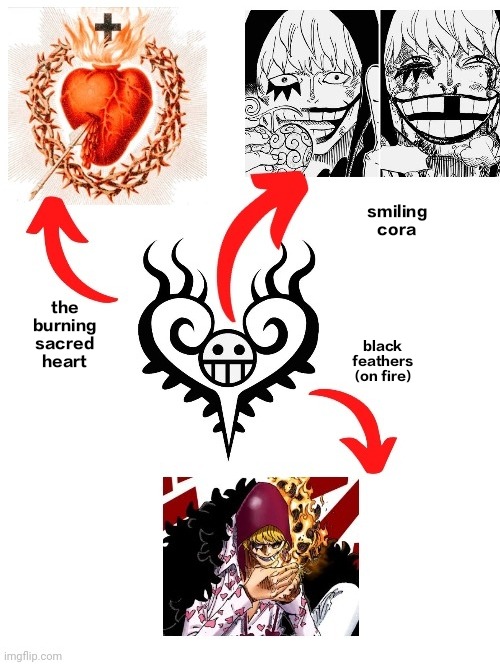
Carving a heart at the dead center of his chest by creating small wounds - the process itself reminds of Cora doesn't it
The custom-made Dressrosa coat is another tribute to Corazon, but IMHO he designed it specifically for Doflamingo, as a mockery.

A cross and circle like dangling a pistol target for Doflamingo's shooting practice, with a grinning face copied from Doflamingo's own jolly roger, but it's Corazon. Like his brother has returned to face his pistol again. A vengeful ghost indeed
And boy did it work...
Doflamingo shot it until the mark was completely drenched and unrecognizable.
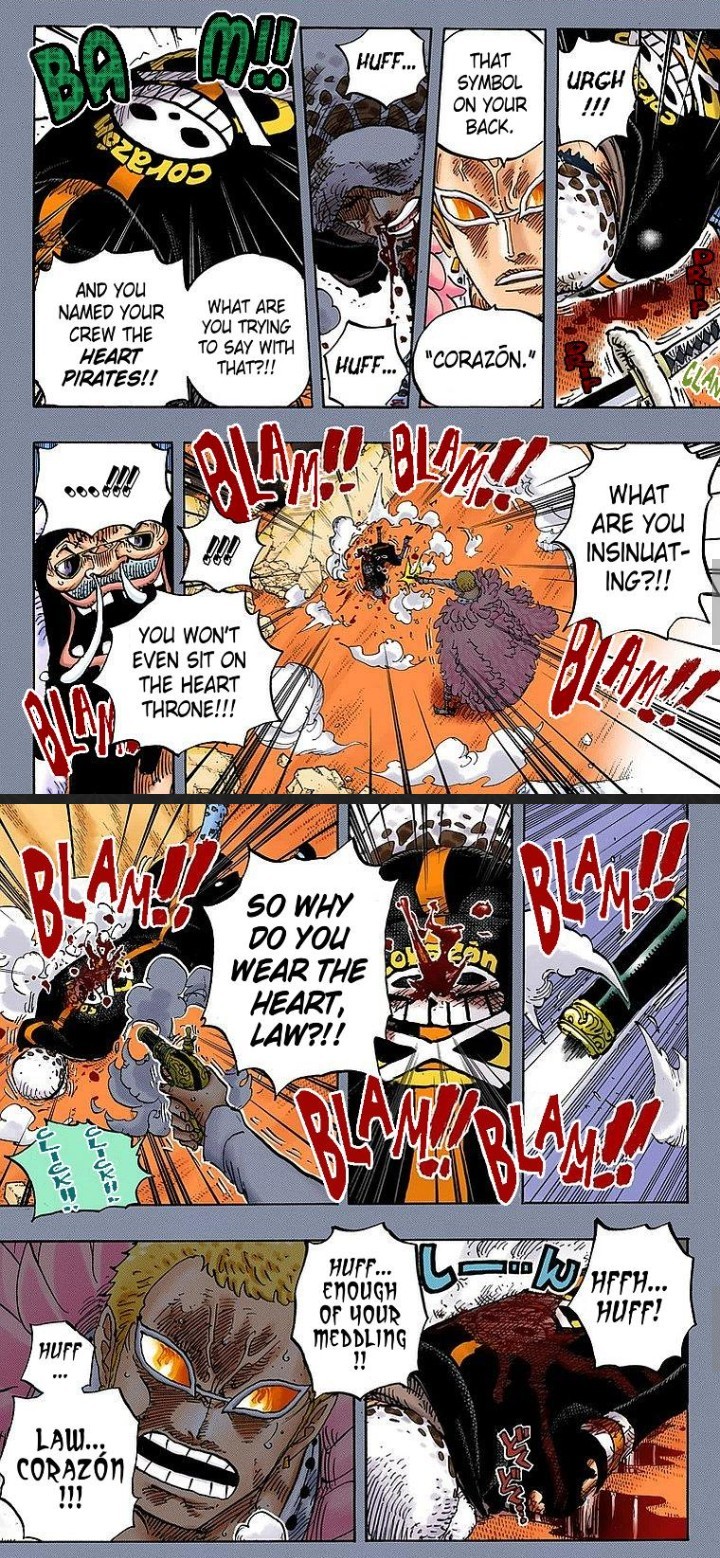
Assuming he draws for all of his clothes himself, here's this masterpiece:
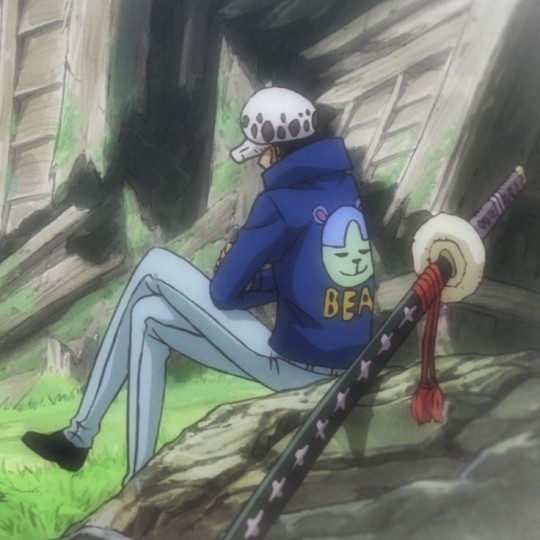
Or maybe it's gifted by his crew mates. Either way, it's adorable.
Since he's a surgeon (and a comic nerd), he should be skilled at drawing human anatomy. How does he draw realistic arts? Does he doodle while taking notes?
We've seen his handwriting in punk hazard arc and it wasn't particularly stylized. Regardless, it'd be nice to take a proper peek at his notebook.
#law's design appreciation#lmao this tag lives on#I miss Law man#if there's any different interpretation please feel free to share them!#one piece#one piece meta#one piece theory#trafalgar law#trafalgar d. water law#donquixote doflamingo#donquixote rosinante#mine
416 notes
·
View notes
Text
GOOD OMENS in CHRONOLOGICAL ORDER (a fanfic helper)
I tried to find this online, but I only found bits and pieces here and there. This should be a very good tool when writing fanfics, or just for understanding the narrative - so, here's my best attempt at a timeline for the canonized events in the show. Let me know if I missed any, or if something is wrong!
CHRONOLOGY of GOOD OMENS
4004 BC: Before the Beginning (Sunday, October 21st, Nowhere, no name for Crowley)
Aziraphale meets Crowley as an angel in Heaven pre-Beginning and Crowley makes a star factory.
4004 BC: The Eden Wall (Rather more than 7 days later, Crawley)
Crowley finds Aziriaphale on the Eden wall and they talk about right and wrong. Aziraphale gave his sword to Adam and lies to God about it. Eve looks about 6 months pregnant.
3004 BC: Noah’s Ark (Ancient Mesopotamia, Crawley)
Crowley finds Aziraphale in front of the Ark and they talk about how God will drown kids.
2500 BC: A Companion to Owls (Land of Uz, Crawley)
Crowley and Aziraphale work together to save Job's kids from God.
1353 - 1336 BC: Nefertiti's reign as queen, during which, at some point, Aziraphale did a magic trick for her. (Thebes/Luxor, ancient Egypt, Crawley) (unfilmed, just mentioned)
We know he fooled her with a "lone caraway seed and three cowry shells"
33 AD: Crucifixion of Jesus (Golgotha, Palestine, name change to Crowley)
Crowley (canonically confirmed female form) tells Aziraphale she showed Jesus the world.
41 AD: Oysters in Rome (41 AD)
Aziraphale playfully tempts Crowley to go eat oysters with him at Petronus' restaurant. If this isn't innuendo, I don't know what is.
537 AD: Medieval England/King Arthur (Kingdom of West Essex)
Aziraphale as a knight of the Round Table meets the Black Knight (Crowley) who suggests the Arrangement for the first time. Aziraphale says no.
1020: The Arrangement is agreed to (unfilmed, just mentioned in the book or by Neil)
I can't find the exact date - tell me if this is wrong?
1040 - 1601: Crowley and Aziraphale act on their arrangement "dozens of times", as mentioned in the Globe Theatre.
As far as I've understood this arrangement (correct me if I'm wrong) it means that whenever they receive orders from Heaven or Hell, they tell the other, compare notes, and if it takes place in the same area, they agree that just one of them has to go do both tasks. Either that, or both tell their respective bosses that the task has been done, because they would have cancelled each other out either way. Letters would probably be too risky communication other than "Let's meet up at....", so I assume they have seen a lot of each other during this time.
1500s: Something related to the Catholic Church and the Papacy (Rome?). (Unfilmed idea)
My theory: Raphael/Crowley (Raffaello Sanzio da Urbino) works as painter in Rome from 1508 until his "death" in 1520. He was invited to Rome by Pope Julius II and was immediately commissioned to work on a series of frescoes for the Pope's private library in the Vatican Palace. Crowley can't enter consecrated spaces. Hilarity ensues.
This would explain his conversation about helicopters (in the book) with Leonardo da Vinci.
1601: Hamlet (Globe Theatre, London)
Aziraphale and Crowley meet inconspicuously as Shakespeare struggles with Hamlet (both actor and play), and Aziraphale agrees to do both his and Crowley's assignments in Edinburgh.
1650: Aziraphale does his first apology dance (unknown)
Nothing more is known about this event.
1655: Agnes Nutter's book is published, and doesn't sell a single copy.
1656: Agnes Nutter is burned (Lancashire, England, 1656)
After writing the Nice and Accurate Prophecies, she is burned by Pulsifer's ancestor.
1793: French Revolution (The Bastille, Paris)
Aziraphale puts himself in harm's way by dressing like a nobleman while looking for crepes in revolutionary Paris, just so that Crowley will save him.
1800s: Aziraphale opens his bookshop. (Soho, London)
I can't figure out when, it just says 19th century online. Crowley asks if Aziraphale wasn't supposed to open a bookshop when he saves him in the Bastille.
1827: The Resurrectionist (Edinburgh, October)
Aziraphale and Crowley discuss morality, meet Elspeth and Wee Morag - and the body snatching doctor.
1827 - ????: Crowley sleeps or is in Hell
We don't actually know long or exactly when, but in the book it's mentioned he only got up to go to the toilet once. Why?
1862: St. James’s Park, London
Crowley is paranoid, Aziraphale won't give him holy water.
1862 - ????: Wild West meetup (Unfilmed idea)
Neil Gaiman just had the idea, it wasn't filmed.
1928: Crowley buys the Bentley
And he keeps it in tip-top shape until the Not-Apocalypse.
1933: Aziraphale gets his driving license (unknown location)
1941: WW2 Blitz (London)
Church bombing, magic show, photo taken, shades of dark and light grey.
1967: Aziraphale gives Crowley holy water (Soho, London)
...And says Crowley goes too fast for him. He does it because Crowley is about to orchestrate the robbery of a church. One of the robbers is Witchfinder Sergeant Shadwell, who we meet later. He offers his 'army' to Crowley.
1980s: Crowley designs the M25 (Hell)
No other demons understand the whole thing about constant, low-level, effortless evil.
2007: Three children are born in a hospital in Tadfield
The old switch-a-roo.
2007 - later that night: Godfather meetup (Soho, ca 2009)
They're drunk, talking about whale brains and agreeing to raise Warlock as nanny and gardener.
2012 - 2018: Raising Warlock (Winfield House, England)
He's way too normal!
2018: Not-Apocalypse (Saturday, August 11th, Tadfield Airbase)
Do I need to explain this?
2019 - 2023: Beelzebub and Gabriel start meeting each other.
We see them meet in an American bar, a Russian café and in the Resurrectionist in Edinburgh.
2020: Lockdown (London)
Aziraphale goes on about cake, Crowley wants to come by and watch him eat. Aziraphale chickens out.
2023: Jimbriel (Soho, London)
A naked archangel with amnesia shows up on Aziraphale's doorstep.
---
UPDATED AND IMPROVED
#crowley#good omens fandom#aziraphale x crowley#crowley x aziraphale#good omens 2#ineffable husbands#ineffable spouses#innefable husbands#crowley edits#ineffable divorce#good omens timeline#good omens fanfiction#good omens fic#good omens ficlet#good omens fic rec#good omens art#crowley good omens#good omens fanart#the bentley#good omens bildad#bildad my beloved#bildad brainrot#bildad nation#bildaddy#bildad the shuhite#a companion to owls#good omens minisode#good omens chronology#good omens#gomens
530 notes
·
View notes
Text
f1 drivers as tracks from the tortured poets department: a very abridged and very biased list.
DISCLAIMER: this is all for fun and should be taken very lightheartedly. Not all drivers were included, but I am open to suggestions as well as constructive criticism.
Without further ado:
CHARLES LECLERC - I Can Do It With A Broken Heart
Absolutely suicidal lyrics that should be mildly concerning but all in all very upbeat and makes you want to run around doing side quests. Such as write an album, or open an ice cream shop. I'm thinking this is specifically 2022 Charles when he trusted no one at Ferrari, or mid-2023 when everyone was calling him washed and calling for his teammate to be n1 driver, and then he proceeded to put it on pole in a tractor multiple times and still hasn't finished outside the top 5 since. Either way, I am looking forward how this song will hit when Charles gets his eventual championship.
MAX VERSTAPPEN - Who's Afraid of Little Old Me?
This one is for Mad Max, who was thrust onto the world stage as an untested young prodigy at seventeen, who was called too young and immature and proceeded to win a GP upon debut in a top team, who was called Crashtappen from 2015-2019 and labelled as overly aggressive to his detriment, who was painted as a villain by every media outlet and documentary and DTS episode, who said "fuck the haters" and won championships anyway, who broke records, and made his own national anthem the expected song for every podium. A driver who is fast approaching greatest of all time status, for his win streaks alone. A driver that most others now just shrug about, because there's no shame in not choosing to fight the inevitable.
LEWIS HAMILTON - So Long, London
Ah, the heart-wrenching track of letting go of your long-term British relationship that doesn't serve you anymore. So many lyrics from here I could apply to the rumoured break down of amicable relations between Lewis and Mercedes, the team he won six championships with. From "My spine split from carrying us up the hill" to "I didn't opt in to be your odd man out. I founded the club she's heard great things about" to "you say I abandoned the ship But I was going down with it. My white-knuckle dying grip. Holding tight to your quiet resentment". Honestly, I could copy and paste all the lyrics here and they would apply to Lewis' Merc swan song. Taylor wrote "you swore that you loved me but where were the clues, I died on the altar waiting for the proof." about Abu Dhabi 2021.
CARLOS SAINZ - The Prophecy
Carlos has been delivering some of the best drives of his career this season, but it doesn't matter because he's not the chosen one, he's not il predestinato, he's not the son of Maranello. No matter what he does, he would never have kept that Ferrari seat over the mythos of Charles Leclerc. "Let it once be me. Who do I have to speak to, to redo the prophecy?"
LANDO NORRIS - Guilty as Sin?
Specifically given for half-flirting with Red Bull for most of last season, only to shake himself out of it and re-sign with McLaren, but I have one eye on him, not entirely sure he's given up on the Red Bull daydream, and Red Bull have been open about wanting to get him, if they can. It's all on Lando to stay faithful.
OSCAR PIASTRI - Fresh Out the Slammer
Piastrigate continues to inspire and compel an entire generation of F1 fans, and as such should form the basis of Oscar's song selection. What was the promises that Alpine made him, if not "Gray and blue and fights and tunnels Handcuffed to the spell I was under For just one hour of sunshine"
FERNANDO ALONSO - Florida!!!
Florida!!! is a big and powerful song about being a Shakespearean villain with a History and questionable morals and motives. Who is that if not Fernando Alonso? "Tell me I'm despicable, say it's unforgivable." "Is that a bad thing to say in a song?"
LANCE STROLL - But Daddy I Love Him
Yeah this one is self-indulgent and too good to resist. He's singing it about Fernando btw. Next.
DANIEL RICCIARDO - Chloe or Sam or Sophia or Marcus
Someone is getting that Red Bull seat next year, and every name is on the list except Daniel Ricciardo. "As the decade played us for fools, you saw my bones out with somebody new." Who knows what would have happened if Daniel hadn't left Red Bull, all those years ago? "Just say you loved me the way you were" Oof. We could spend years living in the What Ifs of it all.
#taylor swift#formula 1#charles leclerc#max verstappen#lewis hamilton#the tortured poets department#carlos sainz#lando norris#oscar piastri#fernando alonso#lance stroll#strollonso#daniel ricciardo
172 notes
·
View notes
Text
Characters care about external stakes. READERS care about internal stakes.
OK. Here's a distinction I've recently started to think about and really notice after reading and watching some things that handle this poorly.
Fiction needs stakes, right? We all agree on that?
Characters have to be doing something, and they need some reason to do things, and there has to be some kind of reward for succeeding or consequence if they fail, yeah?
Cool. So here's the thing about stakes. They can be internal or external.
External stakes are things like: "if we don't do this, the sun will explode" or "if we do this, we'll win the game."
Often, to make things more interesting, external stakes have a ticking clock attached to them. You have to complete your quest before the next full moon or else the spell won't work for another hundred years. You have to score the winning point before the buzzer goes off in five seconds. That tension is important to shuffling the story forward.
But here's the thing.
The reader doesn't give a fuck about the external stakes and the ticking clock. We know perfectly well they're not going to miss the window for the spell or fuck up the finals game. We understand how stories work and how genre conventions work and you're not impressing anyone with your ticking clock.
What readers do actually care about is a character's internal stakes.
Internal stakes are things like "if I can save the world, I can finally absolve myself of guilt for letting my mom die." Or "if I win this game, my crush will finally notice me."
They are personal motivations. They are the reason why your character cares about what they're doing. They are why we care and how we get invested in their story.
Because like. We're humans. At the end of the day, we care about human things and we have human emotions and we relate to people -- even fake people made of scribbles on paper -- who care about stuff the way we care about stuff.
Raising the stakes doesn't mean "make the sun explode if they fail." Raising the stakes means "we care about this person and want to see them succeed."
So why bother with the external conflict and the ticking time clock? If what we actually care about in a story is the person, why can't we just read a couple hundred pages of the character going through therapy and working through their trauma?
Because what that ticking time clock does is it forces a character to act before they're ready. It prevents them from procrastinating. And it makes them do stuff they're not prepared for. And it's thrilling to see them interact with stuff that way, because it forces them out of their comfort zone and into an area where they can grow and challenge their status quo...which is the thing that pushes on those internal conflict bruises.
Imagine that our heroes have as much time as they need to fulfill the prophecy. They can take their time training, studying, making failsafes and backup plans and then go and the plan goes off without a hitch and they save the day without breaking a sweat. That's boring! That's just people going to work. That doesn't force them to confront their inner demons at all! That doesn't rip them from their existing environment and leave them struggling to adapt to new circumstances!
So those external stakes are necessary to keep the plot rolling forward and put pressure on the characters. But ALL OF THAT is only important if that pressure reveals interesting things about those characters, and forces them to engage with the stuff deep inside that they're probably hiding from. Because that's the part that's juicy and interesting for the reader.
Capiche?
631 notes
·
View notes
Text
Skizzekai Community AU
Welcome to the land of Hermiton, a world saturated with magic in the very ground and air itself. In this AU, the hermits are adventurers, rulers of kingdoms, merchants, and more, all in the setting of a medieval-ish fantasy world. As with past community AUs, the contributions of all you headcanoners will be the driving force. But as a framework to build off, here's a summary of the key points in play at the start of our story.
THE MAGIC
Magic flows through everything in this world, with different types of it being most prevalent in different regions. The most dominant type of magic tends to be absorbed by native plants and animals, changing them to fit, so an area saturated in fire magic would be populated by fiery creatures. This includes sapient species- there are no humans in this world, but there is a staggering variety of fantastical races. Most creatures simply channel their magic through inherent traits, like enhanced speed or a breath weapon, but sapient species can additionally shape and direct their own magic for use as spells, learning and growing their skill with practice. Magical crafting and alchemy is also possible, by using the magical properties inherent in everything from a dragon's scales to the smallest of plants.
THE WORLD
Although independent towns and unclaimed land do exist, most of the world is split up into kingdoms, each one with a different magical specialty from the most dominant type of magic within their borders. One example is the kingdom ruled by Joel Smallishbeans, a king recently ascended to semi-godhood from the belief of his people and the application of his own powerful magic. The magic of this kingdom is that of fate and stories, prophecy and lore, and a recent prophecy has been particularly interesting. They say a hero must be summoned from another world, and that they will be needed to defeat a great evil.
THE SKIZZ
And here comes the titular character. Skizz Leman, a completely normal human from Earth, is brand new to this world. He's just been summoned by a man who calls himself a god, told he's the chosen one, and sent out to save the world. He has no idea how to do that.
As for the roles of other Hermits, the magic they might specialize in and the species they may be- that is all up to you! Assuming you've read the guidelines (under the cut), the fate of this AU lies in the hands of the inbox. Happy headcanoning!
Rules and guidelines:
- The end date will be announced later, when the AU feels like it has hit a natural stopping point. A post announcing the end will be made a day in advance of the inbox closing.
- After the AU closes, any remaining asks will still be posted, and discussion on the discord is still encouraged!
- Canonicity of submissions will be taken on a first come, first serve basis. If a later submission contradicts an earlier one, it will be considered an alternate and not part of the "main" AU canon.
- Alternates will be posted with [ALTERNATE] text. They will all still be posted, every idea should be seen, and discussion of alternates is encouraged on their own posts and on the discord.
- Au-related art and writing is strongly encouraged! Please tag hermitcraftheadcanons in your posts if you would like us to see and reblog it.
- Non-AU-related headcanons are still accepted, but will not be posted until all the Skizzekai asks are cleared out once the AU is over.
Thank you all for being understanding and patient about these rules. If you need clarification, feel free to ask.
118 notes
·
View notes
Text
Things To Consider When Writing With Mythologies

Mythologies, often ancient narratives passed down through generations, hold profound cultural significance. They are not just tales of gods and heroes but windows into the beliefs, values, and fears of societies long gone. This is why it’s important to ensure you are culturally accurate and don’t accidentally offend members of the communities you are writing about.
I personally am writing a WIP based around Japanese mythology, so here are some things I think you should consider when writing with mythologies.
Using Myths to Drive Plot and Character Development
Myths can serve as the very essence of your story's conflicts and themes. Imagine a tale where a young protagonist discovers they are the reincarnation of an ancient hero, destined to fulfill an ancient prophecy. The hero's journey in such a narrative would be profoundly tied to the mythological elements, guiding their growth and purpose.
Characters, too, can be shaped by the myths of their world. For instance, in Rick Riordan's "Percy Jackson and the Olympians" series, the characters are demigods, offspring of gods and mortals, and their quests are directly connected to the Greek mythos, intertwining their destinies with the larger tapestry of ancient legends.
Understanding Mythologies and Their Significance
Mythologies have been an integral part of human storytelling since time immemorial. They are not mere tales of gods and heroes but serve as essential cultural artifacts that mirror the beliefs, fears, and aspirations of ancient civilizations. Understanding the significance of mythologies can help us appreciate their profound impact on both the past and present, enriching our fantasy writing with layers of depth and meaning.
Mirrors of Cultural Beliefs
Mythologies offer a glimpse into the foundational beliefs and values of various cultures. These stories often revolve around the origins of the world, the creation of humanity, and the forces that govern existence. For instance, Greek mythology's creation story of Chaos giving rise to Gaia (Earth), Tartarus (Underworld), and Eros (Love) reflects the Greeks' attempt to explain the beginning of all things.
Archetypes and Universality
Myths are replete with archetypal characters and motifs that resonate with the human psyche. The hero's journey, the wise mentor, the epic battle between good and evil—these recurring themes transcend time and culture, connecting us to our shared human experience. As writers, tapping into these archetypes can make our characters and narratives more relatable and emotionally compelling.
Incorporating the essence of mythologies into our fantasy narratives allows us to harness the timeless power of these ancient tales. By honoring the significance of myths, we can create stories that resonate with readers on a profound and universal level.
Using Myths to Drive Plot and Character Development
Myths serve as powerful catalysts for driving the plot and shaping the characters in your fantasy world. By integrating mythological elements into your narrative, you infuse your story with a sense of wonder and connect your characters to something greater than themselves. Let's explore how myths can be harnessed to propel both plot and character development in your fantasy writing.
Mythological Themes as Central Conflicts
Incorporate mythological themes as the central conflicts driving your plot. Whether it's an ancient prophecy, a long-forgotten curse, or a divine mandate, mythological elements can set the stage for epic quests and high-stakes adventures. For example, in J.K. Rowling's "Harry Potter" series, the prophecies surrounding the Boy Who Lived and the rise of Voldemort become pivotal drivers of the plot.
Character Identity and Mythical Lineage
Give your characters a connection to the myths of your world. A character could be the descendant of a heroic figure from ancient times, bearing the weight of fulfilling an age-old prophecy. This connection to the past can shape their identity, motivations, and personal journeys.
Quests Rooted in Mythology
Craft quests and challenges that are steeped in mythological lore. By sending your characters on quests to recover sacred artifacts, defeat mythical beasts, or seek guidance from divine beings, you not only enrich your plot but also create opportunities for character growth and self-discovery.
The Mythic Impact on World Events
Consider how mythological elements influence the world events in your fantasy setting. Wars, political intrigue, and cultural practices may be shaped by the belief in ancient prophecies or the legacy of mythical beings.
Character Arcs Entwined with Myths
Let your characters' arcs intertwine with the myths of your world. As they confront their fears, overcome challenges, and evolve, they may embody the archetypal hero's transformation—rising to greatness or succumbing to tragic flaws.
Symbolism and Allegory in Mythological Writing
Incorporating symbolism and allegory into your mythological writing adds a layer of depth and complexity to your storytelling. These literary techniques allow you to explore profound themes and hidden meanings, making your fantasy narrative more thought-provoking and resonant with readers. Let's delve into how to effectively use symbolism and allegory in the context of myths.
The Power of Symbolism
Symbols are objects, characters, or events that carry deeper meanings beyond their literal interpretation. In mythological writing, symbols can represent abstract concepts, emotions, or significant aspects of the human condition. For instance, a mythical sword might symbolize justice and valor, while a sacred tree could represent the interconnectedness of life.
Allegorical Tales
Allegories are narratives that use symbolic characters and events to convey moral, philosophical, or political messages. Consider crafting allegorical myths to explore real-world issues in a fantastical context. For example, George Orwell's "Animal Farm" uses allegory to critique political systems and human nature.
Symbolism in Creatures and Settings
Leverage mythical creatures and settings as symbolic representations of broader concepts. A mythical dragon guarding a treasure might symbolize the greed that corrupts societies, while a mystical forest could represent the unknown and the call to adventure.
Interpretation and Depth
Allow room for interpretation in your myths. A richly layered narrative invites readers to contemplate various meanings and draw their own conclusions, fostering engagement and making your story more memorable.
Balancing Allegory and Narrative
Remember to strike a balance between allegory and storytelling. While powerful symbolism can add depth, be mindful not to overshadow the narrative's flow and character development.
Through symbolism and allegory, your mythological writing becomes a vessel for exploring timeless truths, moral dilemmas, and the complexities of the human experience. This layer of meaning elevates your storytelling, leaving a lasting impression on readers.
Blending Myths with Worldbuilding
The seamless integration of myths into your worldbuilding can elevate your fantasy realm from a mere backdrop to a living, breathing entity. By infusing every aspect of your world with mythological elements, you create a rich and immersive setting that captivates readers and allows them to fully immerse themselves in the wonder of your creation. Let's explore how to blend myths with worldbuilding to craft a cohesive and enchanting fantasy world.
Mythical Origins and History
Incorporate myths into the history of your world. Legends of ancient gods or legendary heroes can serve as the foundation of your world's creation and early development. These myths not only add depth but also explain the origins of key elements in your world, such as magical artifacts or mystical locations.
Mythical Geography and Landmarks
Infuse your world with mythical geography. Sacred mountains, enchanted forests, and mysterious islands can be inspired by myths or even be the settings of ancient mythological events. The presence of these mythical landmarks makes your world feel magical and mystical.
Divine Architecture and Symbols
Represent the influence of myths on architecture and symbols within your fantasy world. Temples dedicated to mythical deities, sacred runes, or sigils used for protection can add authenticity to your setting, giving readers a sense of a world with deep-rooted beliefs.
Rituals and Traditions
Showcase rituals and traditions that have evolved from ancient myths. Festivals celebrating mythical figures or events can be an essential part of your world's cultural identity. These traditions can create vibrant backdrops for scenes and contribute to the sense of community in your world.
Legendary Artifacts and Items
Integrate legendary artifacts and items from myths into your world. These powerful objects can become central to the plot or wielded by characters of great significance. For example, the Sword of Excalibur from Arthurian legends or Thor's hammer, Mjölnir, from Norse myths are iconic mythical artifacts.
Creatures and Races
Inspire the creation of unique creatures and races based on myths. Drawing from various mythologies, you can invent fantastical beings like phoenixes, centaurs, or sirens. Alternatively, reimagine existing mythical creatures in new and intriguing ways.
Myths and Cultural Diversity
Explore how myths shape the cultural identity of different regions or races in your world. Diverse myths can contribute to varied customs, values, and worldviews. This cultural tapestry enriches your world and provides opportunities for compelling conflicts and interactions between characters.
Avoiding Cultural Appropriation and Stereotypes
As writers, we have the incredible opportunity to draw inspiration from a wide array of cultures and myths to enrich our fantasy worlds. However, with this privilege comes the responsibility to approach the task with cultural sensitivity and respect. Avoiding cultural appropriation and stereotypes is crucial in creating a story that celebrates diversity and promotes understanding. Let's delve into ways to navigate this delicate terrain while crafting a mythologically inspired narrative.
Research Extensively
Thorough research is paramount when incorporating elements from real-world cultures into your writing. Dive deep into the myths, traditions, history, and values of the culture you intend to draw from. Seek out diverse sources and perspectives to gain a comprehensive understanding.
Understand Cultural Context
Cultural context matters. Recognize that myths are deeply rooted in cultural experiences and may carry sacred or sensitive meanings. Ensure that you grasp the nuances and significance of the myths you're using, and handle them with the utmost respect.
Avoid Stereotypes and Exoticization
Steer clear of perpetuating stereotypes or exoticizing cultures. Respectfully depict characters and settings without reducing them to one-dimensional or caricatured portrayals. Create fully fleshed-out characters with their own motivations, strengths, flaws, and complexities.
Collaborate and Seek Feedback
Consider collaborating with sensitivity readers or cultural consultants who are well-versed in the culture you're representing. Their insights can provide invaluable guidance and help you navigate potential pitfalls.
I hope this blog on Things To Consider When Writing With Mythologies will help you in your writing journey. Be sure to comment any tips of your own to help your fellow authors prosper, and follow my blog for new blog updates every Monday and Thursday.
Looking For More Writing Tips And Tricks?
Are you an author looking for writing tips and tricks to better your manuscript? Or do you want to learn about how to get a literary agent, get published and properly market your book? Consider checking out the rest of Haya’s book blog where I post writing and publishing tips for authors every Monday and Thursday! And don’t forget to head over to my TikTok and Instagram profiles @hayatheauthor to learn more about my WIP and writing journey!
#haya's book blog#haya blogs#hayatheauthor#writing community#writing tools#creative writing#writing tag#writing tips and tricks#writing tips#writing tip#writing advice#writing resources#writers of tumblr#writing inspo#writing help#writer community#writer things#writer tips#writer on tumblr#writer problems#writerscommunity#writer tag#writer tricks#writer tools#writer advice#author advice#author resources#author tips#author tumblr
226 notes
·
View notes
Note
I'm doing a College class on Ancient Foods. My focus is on Honey like the different recipes and usages in Medieval era. I found like a couple recipes, a thing on religious relation ("Milk and Honey of Paradise") /Crusades, medicinal use, and possibly bees/beeswax because I was struggling to get something.
Y'all have any recommendations?
(I've brought Zoe in on this one; the following is a collaborative effort. Also I'm assuming you have access to your university library so you can get ahold of the cited material below quickly and for free.)
Can you include beverages? Honey is the main ingredient in mead, which should give you a lot to talk about. Susan Verberg is the premier researcher on medieval mead, and has some excellent works on both mead making and honey production. She has a website at https://medievalmeadandbeer.wordpress.com/ where you can find both her formal publications and her blog.
If you do want to talk about beverages, there were other medieval drinks that used honey. Some citations for you:
Breeze, Andrew. “What Was ‘Welsh Ale' in Anglo-Saxon England?” Neophilologus, vol. 88, no. 2, 2004, pp. 299–301.
Fell, Christine E. “Old English ‘Beor’." Leeds Studies in English, vol. 8, 1975, pp. 76-95.
You can also go into cultural symbolism; here are a couple on that:
Enright, Michael J. Lady with a Mead Cup: Ritual, Prophecy, and Lordship in the European Warband from La Tène to the Viking Age. Four Courts Press, 2013.
Rowland, Jenny. “OE Ealuscerwen/Meoduscerwen and the Concept of ‘Paying for Mead'." Leeds Studies in English, vol. 21, 1990, pp. 1-12.
Also you might want to look into the general concept of the "mead of poetry" from the Old Norse sources. You can find the origin story for that in the Prose Edda, I believe.
Definitely check out https://www.foodtimeline.org for recipes with honey during the period - they have more than you'd expect. There's also a few medieval cookbooks you can parse through. Here's an online one you can sort through that does a great job modernizing the translations: https://www.medievalcookery.com/etexts.html
As for honey itself -- there's actually quite a bit of research on that! Honey was quite a specialized trade, and most of the medieval world used it for sweetener, so there's a good amount of research.
A few leads:
honey as an alternative to sugar, which was expensive, imported, and could indicate class
honey grading: honey was graded based on location/provenance, type (lavender, orange blossom, etc.), and also by grade. However, their method of grading was very different to our modern one.
honey as a preservative, not just for flavor
Articles on this subject:
(DEFINITELY this one!!) Fava, Lluis Sales, et al. “Beekeeping in Late Medieval Europe: A Survey of Its Ecological Settings and Social Impacts.” Anales de La Universidad de Alicante. Historia Medieval, no. 22, 2021, pp. 275-96, https://doi.org/10.14198/medieval.19671.
Wallace-Hare, David, editor. New Approaches to the Archaeology of Beekeeping. Archaeopress, 2022. JSTOR, https://doi.org/10.2307/j.ctv2b07txd.
Verberg, Susan. “Of Hony: A Collection of Mediaeval Brewing Recipes for Mead, Metheglin, Braggot, Hippocras &c. — Including how to Process Honey — from the 1600s and Earlier,” 2017. Academia.edu.
If you want to look more into the medicinal usage, Cockayne's Leechdoms, Wortcunning, & Starcraft collects all the medical & scientific texts of the Old English period. It's old enough to be public domain, so it's available on the Internet Archive and HathiTrust in searchable form, meaning you can just ctrl-F "honey" and see what comes up.
Let us know how it goes!
67 notes
·
View notes
Text
Why the Northern Fremen don't believe in the Prophecy
The reason is just an incredibly simple, sociological reason. What do they keep pointing out about Arrakis? That the south is harsh and uninhabitable... to outworlders. We know this harsh environment increases religious fervour to bolster survival, but what does this mean for the north? Why did they lose their faith?
The settler's cities, Arrakeen and Carthag, are situated in the north. The Harkonnens don't believe the south is habitable so they only mine spice in the north. Their brutal suppression of the Fremen are only in the north.
So imagine you are one of the Northern Fremen. You know there's a prophecy about the Lisan al-Gaib, the Voice from the Outer World that would save your people. But here are these outworlders, who rampage your planet, who enslave and brutalize your people, who only see Arrakis as a resource, and its inhabitants as a means to an end, or "rats" that are in the way of their bottom line. Rats to be exterminated. Seeing all of this, of course you would start to doubt the prophecy. If this is how real outworlders are, why would the Lisan al-Gaib be any different from them?
And this is why Chani and the other Northern Fremen stop believing. They see through its manipulation of the Fremen. But they also understand that if the Fremen band together and fight back, they can win battles on their own. The Southern Fremen don't see any of this, because they're essentially protected from the violence of the colonizers by the dust storms near the equator. They might hear stories about the Harkonnens, but that wouldn't shake their faith in the Lisan al-Gaib. They are willing to simply wait for the "right" kind of outworlder, which does come along in the form of Paul and Jessica.
I think this is a really clever explanation of this divide in the thinking of the Northern and Southern Fremen, which is also related to the idea of how the environment that people grow up in shape their beliefs and their culture. Even though this is a departure from the first novel, this change is still true to the spirit of Frank Herbert's Dune.
#dune#dune film#dune part two#dune part 2#the fremen#fremen#dune movie#chani#lisan al gaib#analysis#sociological storytelling
112 notes
·
View notes
Text
✩Writeblr Intro✩
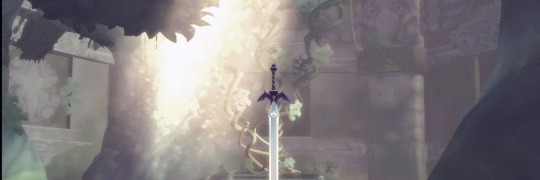
✩About the Author✩
Hello there ! I am Arthur and I am a writer who decided to make a separate blog just for my works and such. My main blog is @saintv0id if you are interested for whatever reason. I go by either Arthur or Void on here whichever is fine. I go by she/her and am also demiromantic
I like anything fantasy and fiction, and other such things like renaissance festivals, the medieval and renaissance periods, I like collecting bugs and bones, and I love musicians like Hozier, Tamino, Florence, and Noah Kahan
✩About this blog✩
• This blogs purpose is for my writings/stories and whatever relates to them, like OC intros, lore revealing, or really whatever takes place in my world
• I am open to any asks, questions, or msgs, or even recommendations if ya wanna know anything or submit something, please do so
• All stories and writings on here are all within the same world/universe that i have built, they are all connected one way or another
✩About how my stories work✩
• Again all of my stories take place in the same world, which I have called Allra, so all of my stories together will be called The Chronicles of Allra
• If you are interested in the basic lore and history behind Allra, I will soon have a post up with all the info, I will add the link here once updated and completed
• Allra is heavily influenced and based around Norse mythology, although all characters and lands are original, they are inspired by the norse mythos and the norse mythos are even implemented into the world’s history somewhat
• Some stories will be multiple parts and others will be just short stories involving random characters within the world and some will have a bigger impact then others
✩About my WIPS✩
Prince Killer:
• Genre: Fantasy & Adventure
• Warnings: Murder, hints of emotionally abusive family (will update if the list expands)
• Tropes: Magic, found family, retelling with a twist, major angst, royalty, fighting against prophecy & destiny, morally grey MC, family rivalry, major symbolism
• Main & Side Characters: Locke Ambrose, Caradoc Ambrose, Kailen Skaesun, Elwin Ambrose, Toke Ambrose (There’s more but those 5 are really the ones that need to be noted)
• Summary: In a world that was reborn after the events of Ragnorak, history seems to repeats itself as the King of Konunheim hears word from one of his trusted prophesiers that his son, Caradoc, will die by another’s hand by a simple arrow made from a harmless plant and if this were to occur the world may break out into another war and destroy itself. Assuming his last born, Locke, may be the killer due to his certain ways and dislike of his brother, he demands for his punishment and a way to keep Caradoc safe. While the other nine courts are splitting apart over the idea of a apocalyptic war, the two brothers now have to find a way for one of them to be pardoned and the other to not die while also preventing a war, and maybe even find out if Locke actually has intentions to kill his brother and follow through with prophecy or keep Caradoc safe…
(other works are in progress, I will update this list as I work on them more)
#writers on tumblr#writblr#writblr intro#writblr introduction#writing#writers and poets#writerscommunity#original character#original writing#fantasy#fantasy world#fantasy writing#worldbuilding
97 notes
·
View notes
Text
The Passion Of Jimbriel
Part 1: The Entry into Soho
The story of events leading up to the crucifixion of Jesus, and the days following, until his ascension to Heaven, are collectively known as the Passion narratives. It comes from the Latin "to suffer," or "to endure."
More than one op has mentioned there are parallels to this in S2, so I thought I would try and find how well the whole narrative was followed. Oh yes, is the short answer, it certainly does! And how! And in places you might be surprised about. I hope this series of metas might answer some of the odd mysteries of "why is that there...? that are still floating around at the moment for you.
I've tried to match the narratives to scenes and incidents in S2 as closely as I can, but I only have sketchy Anglican Christian background, so if you have had a more thorough Catholic upbringing than me and see something I have missed, slip me a message and I'll do my best to edit things.
A word of warning before we start - it's not a linear match-up. I'm planning to run through the traditional sequence of the Passion in order, but will match with the S2 scenes as needed, and those are scattered back and forth in time. It's Catch-22 again - everything thrown up in the air and landing at seeming random places, where ever they seem to fit best for the narrative.
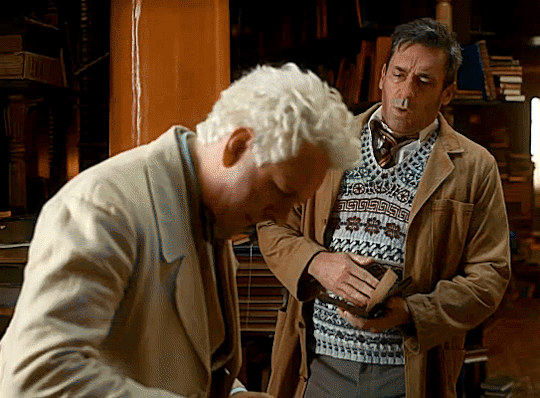
AZIRAPHALE: Ah, you startled me.
GABRIEL: Is that good?
AZIRAPHALE: I just didn't see you coming.
I actually thought I might start with this little scene, where Jim gives Aziraphale a jump-scare by creeping up next to him silently. Annoyed, Aziraphale tells him to make some noise as he moves about, and Jim trolls him with some creaking noises, before starting to sing.
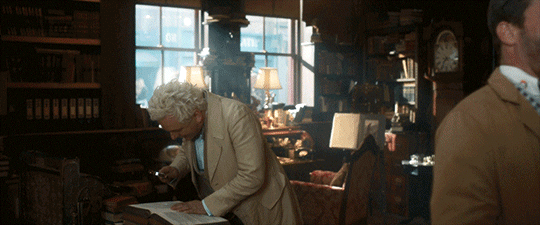
There were prophecies about the arrival of Jesus, but the ironic thing here is that Aziraphale, someone who has a vast collection of prophecies and is someone you could consider an expert, had no warning of Gabriel's arrival - he just crept up to the door as a nasty surprise!
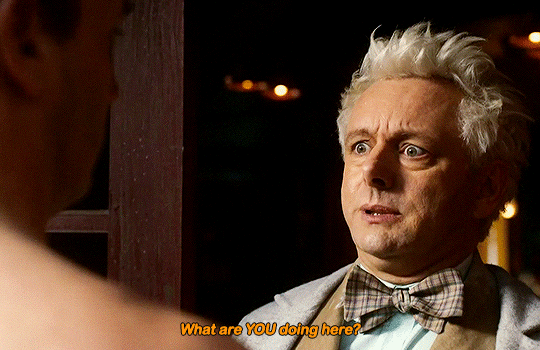
Starting proper, there were the three temptations while Jesus was fasting in the wilderness.
Making bread out of stones (I've also covered the Eccles Cakes here in the Altar of Eccles Cakes. They have multiple purposes!)
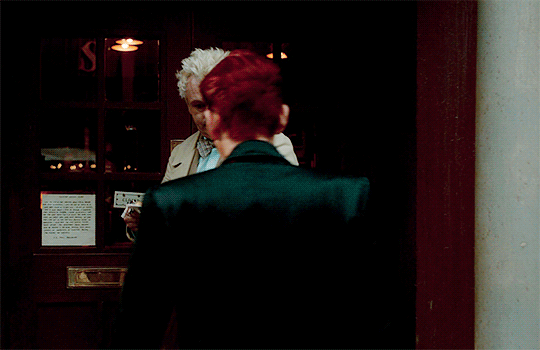
2. Being tempted to jump from a pinnacle of a temple and relying on angels to break his fall.
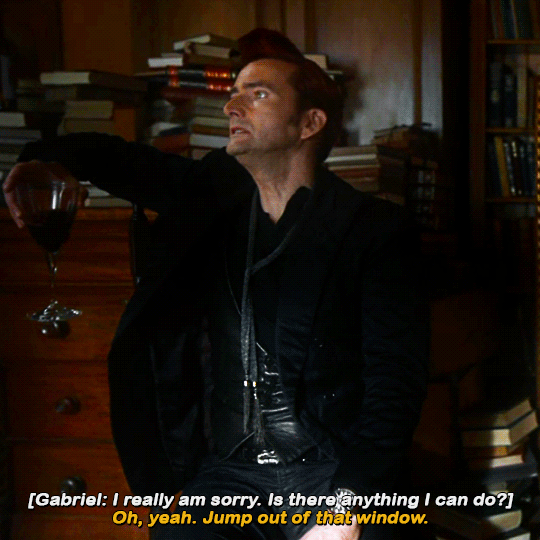
3. Being tempted to worship Satan in return for ruling all the kingdoms of the world.
This one was actually covered in S1, at Golgotha. I know Crowley mentioned to Aziraphale that he was the one who tempted Jesus, but I wrote a meta about it because I realized most people were missing the joke in the TWO demon names that Aziraphale suggested Crowley had changed his name to, and how that relates to that particular temptation.
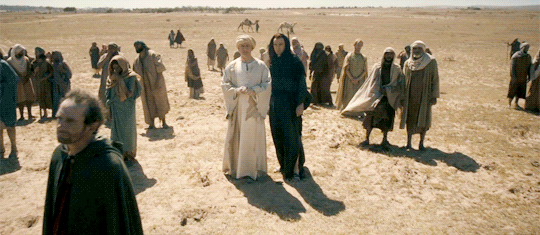
The last miracle performed before the Passion was the raising Lazarus from his tomb, four days after he had died.
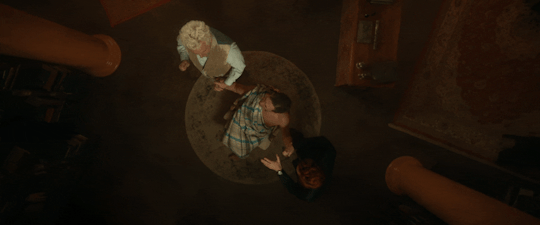
After Crowley is dragged down to Hell for an interview with Lord Beelzebub and finds out they are being threatened with the Book Of Life for being involved with Gabriel, he rushes back to Aziraphale and says they have to hide them. As they decide they will try a shared minor miracle Jimbriel descends the spiral staircase:
GABRIEL: Hello. Where did you come back from?
CROWLEY: Outside.
GABRIEL: Outside? Hmm. Is it big? Can I see the outside?
CROWLEY: No, no, no, no, no. No, no no. You need to stay here, inside the bookshop. We can look after you in here. Just stay here.
Inside? Inside the tomb? Aziraphale has even 'wrapped' him up for the occasion.
Later, we find out that:
AZIRAPHALE: Jim is in his bedroom upstairs. I told him bookshops are always closed on a Wednesday. As for Inspector Constable, at a guess, they were sent to verify the 25 Lazarii miracle you and I seem to have accidentally performed together the other night.
CROWLEY: That's how you lot measure miracles? How many times it could have brought someone back from the dead?
Uh huh. The miracle of Lazarus.
The Entry into Jerusalem
Jesus made his way into Jerusalem by donkey to show that he came in peace, not as conquering king on a horse. Gabriel does the same.
But he walked in, you say, on foot!
Yes, but he walked by the Dirty Donkey pub on his way to bookshop.

Next, was the Cleansing of the Temple.
What temple? The bookshop, of course! Is it not a temple of books?
Aziraphale sets Jim to cleaning it, with a duster.
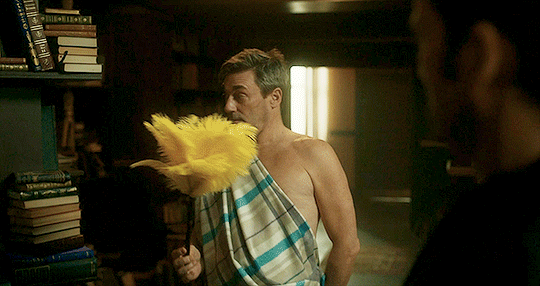
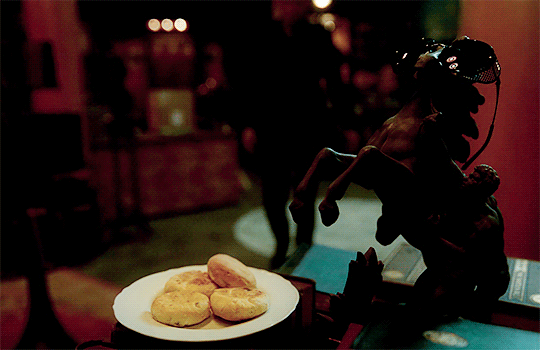
I'd say you could also call the bookshop a temple to Crowley - it is decorated in his colours, after all. The presence of Jim initially drives the merchants and money dealers demon away, snatching his sunglasses from his mini-altar as his goes.
The last step on the Passion I'll cover in this meta is the Anointing of Jesus. It tells the story of how Jesus had an expensive perfume, worth a year's wages, poured on his feet from an alabaster jar by woman who was considered sinful. The gathered Disciples were aghast at this waste - they asked why she did not sell the perfume instead and give the money to the poor. Jesus thanked her for preparing him for burial.
This one had me stumped for a while, and I had to think hard about where something had been "poured out" on feet, because I was pretty sure no one had been "anointed" on the head, which is another version of this part of the narrative. Then I remembered seeing a GIF that was Aziraphale focusing on the floor for a number of seconds after Crowley had upended the box Gabriel had carried to the bookshop with his fly in it to read the message on the bottom of the box.



My precious...! You poured them out at your feet, Crowley!
Alabaster is a soft white stone that is easy to carve. The bland cardboard box makes a good analogy for this. And in it we see Aziraphale has filled it with priceless treasures - not one but two lost Shakespeare plays!
If at this point you are going "Wait - Wot? Now you're telling me both Jim/Gabriel and Crowley are playing the part of Jesus here?" I'm saying yes. It's not the first time I've said it. I'm not the only op who has been saying it, either. And as we head into part two of this meta you'll see Crowley take on more of this role from Jim/Gabriel. The two of them have a lot in common, much more than you might have suspected or might even want to acknowledge. This is the past echoing into the present again. I think it also gives us some interesting things about the future to contemplate.
Next: Part 2 - Trials and Denials
Where we move on to the Last Supper, and the Arrest of Jesus before his before he is judged before a court of priests and then Pontius Pilate, and the gathered crowd.
This post was inspired by @mr-period 's long meta Remembering Something Forgotten-Where is Jimmy Boy?
More reading on the Dirty Donkey in my meta here.
#good omens#good omens 2#good omens meta#aziraphale#crowley#good omens analysis#good omens theory#gabriel#jimbriel#the passion of jimbriel#the passion#golgotha#the dirty donkey#i am in the fly#25 lazurii
98 notes
·
View notes
Note
Hi! The Zukaang prophecy dream person here. What you said about a lot of people not even considering Aang and Zuko as a ship made me think. Following that thought, I fell down a rabbit hole that turned into something a lot deeper than just shipping discourse. I'm not a professional psychologist or anything, but I hope some of my insight on this topic is interesting. I apologise in advance for so many words to read!
As a kid I remember being very clueless about romance. I never really interpreted Aang's affection towards Katara as romantic at all, and I honestly have no idea why, since they literally kissed on screen multiple times. So that's why, for years, I remember trying to find a ship that I would like, yet nothing seemed to click just right. That is until the Avatar Renaissance of 2020 when a lot of new people joined the fandom, and a flood of new discussions arose, way different than it used to be years ago. It made me realize that the core of the issue lies in Aang himself. At least that's my own theory, feel free to disagree. A lot of popular avatar ships include everyone from the main cast, but rarely ever Aang himself, apart from the canon Kataang. In all aspects, Aang is an unconventional protagonist, one unheard of at the time. He is a monk, he is a pacifist, he is a vegetarian. For an average kid or teenager in 2005, I don't think much of these aspects are too relatable. We were and still are used to seeing agressive, determined teenage protagonists, ready to beat up the bad guy at any opportunity. That's what was considered "cool". So a bald 12 year old boy with an arrow on his head who grew up in a temple, surrounded by monks, who avoids hurting people, even those who wiped out his entire nation, is simply foreign. You often hear arguments against Kataang: he is too young for her, she sees him as a little brother, they simply don't fit. Those are all false statements, as rewatching the show without bias you can clearly see them love each other deeply and mutually. Aang is a child, but he is a person too, someone with his own values and principles, and so is Katara. To me, both of them are deserving of love, Aang is deserving of Katara's love.
I am now going to talk about the genocide of the air nomads, as I think I can provide a unique perspective on this. I am Ukrainian. The russian invasion of my country has been going for 10 years now, but two years ago specifically my whole world turned upside down when russia launched a full scale invasion, intending to conquer all of Ukraine. A lot of my beliefs of how the world worked changed drastically. Seeing myself from years ago in people from around the world, not yet knowing war, I think this is something you have to experience yourself to truly understand what it means for another nation to want yours erased from existence. Aang's entire nation is gone. Everyone. No one is alive, not a single person. I don't think many people truly let that sink in. He has to keep going every day with the knowledge that the world he is in doesn't have a place for his nation anymore. He has nowhere to go and no one to come to. He has the gaang, and that's wonderful, but it's not the same. He is the only person in the entire world who truly bears this pain. To me, imagining that for myself, is an indescribable horror. To imagine having no place to come back to, living among strangers who know nothing of you and your people. Yes, he has the temples that preseve history, but how much of them has been destroyed? Even the people at the Northern air temple, although fleeing a disaster, still contributed to the destruction and loss of that history.
Yet, bearing this unimaginative hurt, Aang is able to forgive. He is able to make peace with his loss, and let go of his feelings of rage. He wants to see good in the Fire nation people. And through that, he is the only one who can truly see Zuko as he is. Having let go of anger and hurt, he can see the genuine wish Zuko has for atoning for his family's sins. He can literally see through him, all his feelings and thoughts, like no one else. He holds no grudge, no hatered for him. If you ever have a war, genocide unleashed on your country, you would know how impossible it is to forgive. Yet, Aang, as the avatar, has no choice but to do just that, to let go. I think that alone makes Aang one of the strongest people in the avatar universe.
But how is this relevant to the Aang ships being dismissed? Circling back, to me, this is a matter of understanding. People resonate with Katara for her experience as a younger sister, thrown into the role of a mother figure, for her experience as a teenage girl in a sexist world, someone with a desire to become stronger despite being denied that opportunity, be it by the circumstances or by someone stronger than her deeming her "unworthy". People resonate with Sokka for his struggle to become a reliable leader, for his insecurity being the only one without a special "talent" (aka bending). Toph for her sheltered upbringing and parents that are unwilling to see her as more than just her disability. Zuko for his struggle with his identity, his own values versus those forced upon him, an abusive household, repressed emotions and anger, being a sibling of someone way more naturally talented, coming to terms with the hurt he has caused and atoning for it. But what can people find in Aang that resonates with them? All of what Aang is, is grand and bigger than yourself. I relate to Aang as someone whose nation is being subjected to genocide, but is that a common experience? I'm sure that nowadays a lot more people came to appreciate Aang's character more, but as a child in the 2000s, would you really say you saw yourself in Aang as much as you saw yourself in Sokka, Katara, Toph or Zuko?
In conclusion, my theory is that, because of how unique Aang has been written, that prevents people from seeing him as someone they could imagine in a relationship with someone else. After all, how can you write about someone you don't share many life experiences with? How do you write them in love? How do you make someone so different from you come to life?
Anyway, thanks a lot for reading all of my brain vomit. Avatar is truly a goldmine for character analysis and study. Would really love to hear what you think!
I absolutely loved reading your analysis on Aang's character, anon. I agree wholeheartedly with everything you've brought up here. I think it's so true that many people (whether they're conscious of it or not) view Aang through a certain lens due to how unconventional of a protagonist and person he is. To many, he's not "supposed" to be the one who "gets the girl". He's not your stereotypical handsome/buff/rugged teenage boy protagonist; he's small, kind, goofy, and pacifistic. And I think in general that people find it difficult to wrap their heads around a male character like Aang not conforming to Western and/or patriarchal society's expectations/conventions when it comes to behavior and overall physical appearance. I think this also results in a lot of people unconsciously infantilizing Aang and having a hard time viewing him in a shippable way.
It's also interesting that you brought up Aang's almost "otherness" when it comes to the world he finds himself in when he awakens from the iceberg - he is the last one of his kind in a world where nobody remembers his people. He's from a culture that is vastly different from the ones that remain in the world. His philosophy, mannerisms, gender expression, appearance, etc. are all completely unique, not only canonically in the post-genocide AtLA world, but in our world as well, especially in the West.
The fact that despite everything Aang has been through, despite all the atrocities he has witnessed, he still is able to remain true to himself at his core through to the very end is so moving to me. Aang will always be my favorite character all time simply because of who he is. Even as a kid, I loved him so much - I never had a crush on Zuko or Sokka, it was always Aang. He represented not only the type of person I would want to be, but also the type of person I would want to be with. And sure, he's not perfect, but that's another one of the many things I love about him - he's human, he makes mistakes.
I feel like I could say more, but you already wrote so much good stuff in your analysis, and I'm not sure if there's much I could add haha.
Also, thank you for sharing your perspective as someone who lives in Ukraine - I can't imagine how difficult it must be to be dealing with all of Russia's BS the past decade, and especially recently. I sincerely hope you're staying safe and healthy! <3
27 notes
·
View notes
Text
Ninjago Fic Rec Week: Day 1
Prompts: Canon/Lloyd Recs! The hard part is not recc'ing everything I've got because I have to save some for later days sgkhjggsf
Canon Recs:
Pathway:
Canon-compliant look at how Wu and Ray's relationship over the years have helped shaped Wu into the person he is today (and the connects he makes with Kai in the process). As a suck for all things Wu and his dynamics with people, this is a must-read rec from me <3
Enclosed:
A canon-compliant mystery where Lloyd, Zane, and Nya start to pick up on a few things that just aren't quite right. Still just getting started but a gripping read nonetheless!
Ready to Fly
A bit of a Canon and Lloyd rec, this focuses on Lloyd's capture by the Overlord during the events of Season 3! Which, again, is probably something I would have loved to see in real time snksnkssk
Raising Hell
Another double-whammy for canon+lloyd focus (can u tell what I like), follows the story of Lloyd finding his place on the team (and with others in general) especially in the case of the Smith Siblings. I go back to it all the time for the top-notch characterization and even just the dialogue. Siblings will being siblings <3
Lloyd Recs:
Lord Garmadon is Not Impressed With the Future:
Essentially it's S2!Garmadon getting flung to the future to where S8!Garmadon is making a mess of his legacy, but it views Lloyd in the lens of both versions of his father and it is a FASCINATING read, and a nice little 'what if' that really makes me wish something like it happened in canon!
Far Too Good, Far Too Soon:
A tale following some of Lloyd's time at Darkley's, where he inadvertently comes to learn about the pieces of the prophecy of the Green Ninja...and also, his eyes turn green in the process. Totally just a coincidence, yeah? Right up my alley when it comes to worldbuilding. And Darkley's stuff. And Lloyd.
Myrtleberries:
Lloyd and Sensei Garmadon bonding, and getting used to the new changes both of them have gone through over time (or rather, the fact that it hasn't been very much time at all)
planetary go
A fic where Llloyd gets a taste of what it's like to be a "Normal Teen" going on a "normal school field trip", but of course ninja-related shenanigans get in the way. Good thing the friends he's with don't mind too much!
what happens if you put a vampire on the sun?
Still one of the funniest things I've ever read, the world somehow becomes convinced that Lloyd is a vampire and the rollercoaster of a journey that takes is nothing short of good, light-hearted fun and shenanigans~
Pipes, Paint, and Other Ordinary Things:
Another fic where Lloyd and Garmadon bond, although this time Garmadon's a little too much like a dad and Lloyd, for the most part, is just happy to be here snksnkssnkn
Constant:
Short but POTENT take on Lloyd, Garmadon, and the prophecy of the Golden Master which ofc speaks to me on a personal level aaaaa
#ninjago#ninjago fanfiction#ninjago fic rec week#lloyd garmadon#lord garmadon#there's a lot of lord garmadon on this lloyd list snksnknk#fic recs#also tried to avoid some fics i saw that got recc'ed already aaaa#temptation was strong tho#also i'm a day late don't look at me it's OKAY
110 notes
·
View notes
Text
Sort of related to the post about people coming in for shipping but something that’s struck me, as actual play fandom has spread, is that there is a certain lack of genre awareness currently - not just surrounding Critical Role, to be honest; it’s a frustration for me for the conversation surrounding Dimension 20 and Worlds Beyond Number for a while as well.
Take fate, for example. The idea of fate, whether it’s as specific as an ancient prophecy, or as broad as the general concept of destiny, is absolutely at the core of so many classic fantasy series that to be vehemently opposed to it within Critical Role is to display profound ignorance of the genre of fantasy. It’s akin to showing up to a sporting event and getting mad that people are running around in athletic gear; it’s like going to an Italian restaurant in the US and screaming in the face of the waiter when they give you bread and olive oil. There is not, per se, a required reading list. You do not need to read nor watch all of Lord of the Rings let alone consider it a formative work; Sam Riegel and Aabria Iyengar sure haven’t. But if you are not familiar with the genre at all, at the very least you do need to come with a certain awareness that you are not familiar with the genre and be open to its conventions. And to be clear: it’s valid to hate the theme of things being fated. But again, that’s like hating they serve bread and olive oil at the Italian restaurant; you should probably simply not go to Italian restaurants.
Another example that is my personal source of irritation is the obsession with radiation as a factor in Burrow’s End. Setting aside my original irritation at just good old-fashioned lack of reading comprehension with the conflation of the poison and the Blue/the Light, the idea that the intelligence was induced by radiation is really…not genre aware. Like, I recognize I’m coming at this with rather more knowledge than average (from a scientific rather than genre-aware perspective no less) but to get back to genre, I take no issue with, say, radiation in comic books. I know the premise of Spider-Man or of Doctor Manhattan’s origins is absolutely ridiculous; but that’s the genre. Radiation in comic books exists to be an easy origin story so we can get to the point of “here’s a guy with powers”. However, in a show that derives its narrative language from Watership Down and Mrs. Frisby and the Rats of Nimh, the idea that the magic and the lightning and the source of intelligence are radiation makes little sense. Another example is the weird response to Skip in Starstruck; the idea of an alien brain parasite like that is so genre-typical to space opera it feels like, again, someone going to an Italian restaurant, pointing at the bread, and saying “WHAT THE FUCK IS THAT? HOW DARE YOU!”
I think my particular frustration with both of the above (and when I talk about Worlds Beyond Number) is that those people ignorant of genre and not letting it wash over them a la Sam will often fall back to the real world (although, unfortunately, not when it comes to radiation) when trying to make sense of the narrative without the signposts, language, and tropes of the genres to which they belong. To understand the subversions or deconstructions that are likely to occur in, for example, the upcoming exploration of the Citadel in Worlds Beyond Number, you need to be open to the idea that it is a complicated place and not simply The Evil Empire That Suvi Will Definitely Leave; if you’re utterly suspicious of everyone and refuse to try to understand why this is a place people enjoy let alone will die for, you can’t actually experience the story. We are going into the Citadel arc; these wizards will be humanized, and if you have closed off your mind to them already you have set yourself up to be miserable.
I do think it’s great that actual play has found an increasingly large audience, but the medium of actual play also carries a certain lexicon and ignorance of it will skew one’s interpretations. My personal bugbear here is of course interpreting bog-standard tanking strategies as either romantic or self-sacrificial in intent, but in general, any resistance to the mere concept of gaining power, the existence of concrete deities, combat, and the placement of plot above romance in D&D are all signs of this ignorance. And again: ignorance is fine! But with all of the above there also often comes this entitlement to a story that is familiar, in blatant disregard for those parameters of genre and medium, and I have to wonder, again, why people mad that a fantasy story is leaning heavily on fantasy story norms, or why D&D has combat, are still showing up to the fantasy D&D story. To return to the Italian restaurant, which is getting a lot of terrible patrons in this metaphor, it feels like a lot of people are showing up to this restaurant because they heard it was good, but then becoming furious it won’t serve them peanut butter and jelly. People who are not familiar should still be welcome, but that lack of familiarity needs to be accompanied by an openness and desire to learn, rather than the entitlement that is so often present.
64 notes
·
View notes
Text
S1E2 – The Book Write Up P2 – 11 years ago and The Present Day/Thursday (2 days to the end of the World) (up to Aziraphale and Crowleys’ arrival in Tadfield)
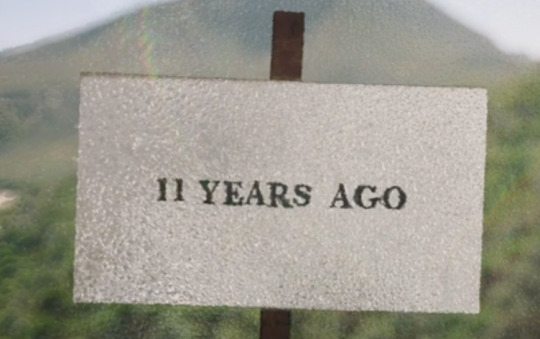
Alright, let’s get dug straight in, shall we? There’s a lot of background narrative being covered in this section, including the introduction of quite a few new characters.
Let’s start with Anathema. I don’t have a lot to say about her intro scene, but I do have two questions:
Why THE HELL is her mother allowing her to draw in that book? It’s the only copy of a 350-year-old book that contains prophecies that have all proven to be correct. In reality that book would genuinely be priceless, and we will see later in the series that the book is still considered valuable to the family. I don’t like writing notes in my cheap paperback books, so the idea of a child drawing IN COLOURED PENCIL in this book chills me to the bone, yet her mother just lets her do it without so much as a blink of an eye. Mad woman.
We know that the book contains prophecies up until the end of the world. We also know that at least one of the prophecies contains an actual year (1980 – the one with the Apple). Furthermore, we know that Anathema is named specifically in one of the prophecies. Just how many Anathemas did this family have in the hopes that one of them would be the one to save the world? Logically, only children born after 1980 would be eligible but that still leaves at least one generation of descendants prior to the one we see in the show. I suppose there could be another prophecy that states what year “the” Anathema was to be born but I like to believe that somewhere there’s a little group of related women called Anathema all fighting over who gets to save the world.
Next up – Newton. Again, not an awful lot to say here, other than the camera crashing into his bedroom window makes me laugh every time I watch it. I don’t know why this specific moment was chosen to break the fourth wall just as much as I don’t know why I find it so funny.
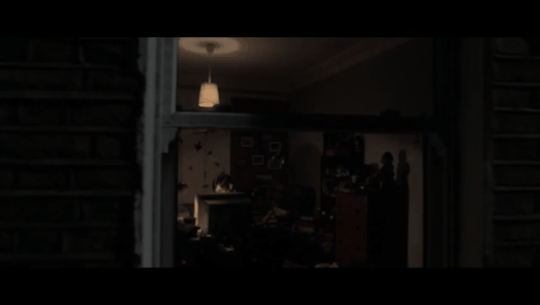
Having worked in IT for more than ten years, I can say without a doubt that there really are people like poor Newt who are cursed with breaking anything computer-related just by looking at it. They’re exasperating because they usually think the whole thing is one big joke and hold their technology incompatibility up to be some sort of prize. At least Newt has the decency to look abashed by his strange “gift”.
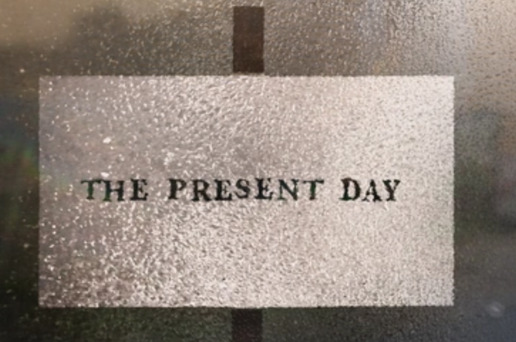
Newton’s home location is confirmed to be Dorking in his first present day scene when we see his mother shipping him off to a new job. We don’t know the location of the United Worldwide Holdings (Holdings) office in which he attempts to establish a hold as a wages clerk, but I can say for certainty that the location of his introduction to Shadwell is central London. For those whose UK geography is worse than my own, it would take over an hour to get to central London from Dorking, regardless of the transport mode of choice. This has always struck me as rather odd – it’s clear that Newt has difficulty holding down a job. The home that he apparently shares with his mother looks pretty run down from the outside, suggesting that money isn’t exactly a commodity in their household. So why would you take a clerical job, that likely doesn’t pay much, in a place that’s over an hour away? Perhaps Neil and Terry just chose Dorking as Newt’s hometown because it has a slightly funny sounding name…
Side note: the chances that the Hot Dog van that Newt and Shadwell get their drinks from would be allowed to park there, right behind the Houses of Parliament and directly in front of Westminster Abbey, are null. I would even go so far as to suggest that Shadwell himself would likely be moved on pretty sharpish from his chosen pulpit. Makes a pretty impressive backdrop though, hey?
Let’s just take a moment to have a chortle at Shadwell’s ideas of what sort of activity would give the game away for any self-respecting witch:
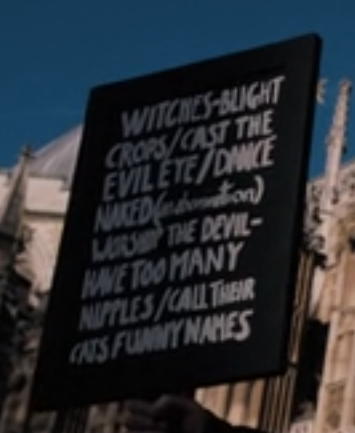
Speaking as the last in the line of Welsh “wise women”, I can (pretty much categorically state) that none of my ancestors have done any of those things. Maybe apart from calling the cats funny names, though most of my maternal line had/have a strong dislike for animals of the feline variety. My cat is called Kishi, which is supposed to be Japanese for “love bound to Earth”. It’s a wholly inappropriate name for her, as she’s really just a massive prick, like every other cat there is.
Why does Newt stop to listen to Shadwell here? Why not just ignore the crazy man on the pedestal like every other person in London? Obviously that would cause a bit of a plot problem. Perhaps it’s his ancestral right driving him into the arms of the Witchfinder Army – there are certainly crazier things that happen in the GO universe! As it turns out, Newt’s recruitment is well-timed, what with there not being any soldiers of rank higher than sergeant, and only one of those at that.
Easter egg time!
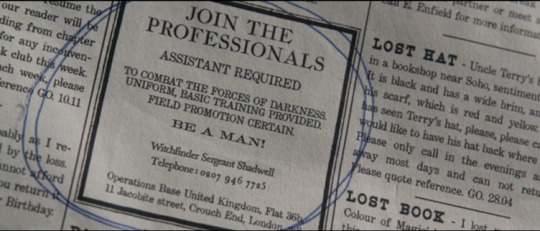
This ridiculously quick shot of Shadwell’s newspaper gives us a veritable treasure trove of Easter eggs/nuggets of information for the keen eye:
Shadwell’s address is confirmed as located in Crouch End.
The reference numbers for the adverts begin with the letters “GO”.
There is an advert for a lost book, which we can just make out is one of Terry’s – “Colour of Magic”.
Save the best for last! The advert for a lost hat clearly describes Terry himself, and his signature hat and scarf. Not only that, but he apparently lost it in a book shop in Soho. I wonder which one that could be…
This fleeting glimpse of newspaper is a perfect representation for one of the main reasons I love this show so much. Most casual audience members will never see it. Some more interested parties will see it and think little of it. Others, like myself and likely anybody reading this waffle, will not only see it, but understand the references and then squeal with delight at the little present that was left for us to find. It makes me feel valued as a fan whilst at the same time as if I’m sharing in a secret that the creative team has left for me. This is great television making at its very best.
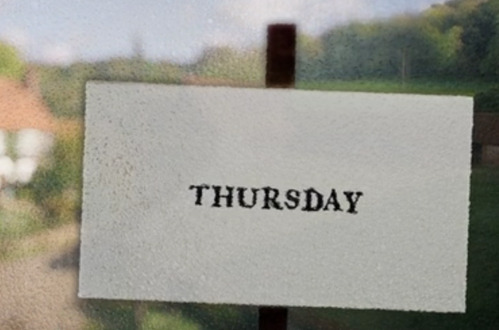
Quick Easter egg here in Jasmine Cottage: the image that Anathema has pinned on the wall to represent the Antichrist is the same as the one used on the playing cards from episode 1 (albeit in black and white):

When we find ourselves back with Crowley in his apartment, he’s clearly furious with himself about losing the Antichrist. We also learn that he discovered the joys of tending to houseplants in the early 1970s. I’d like to think he inserted them into his life after the event that takes place in 1967 between himself and Aziraphale (which we will see in the next episode) – perhaps he was looking for something that he could try to use as some sort of poor substitute for his true desires? The presence of the houseplants and the timeline for his discovering of them is included in the book, so in honesty I doubt this was the intention for their purpose, but I like the possibility nonetheless. The scene with the houseplants provides a little nugget of information that we can store for reference for later – Crowley’s houseplants actually shake when they’re frightened.
Once again, I don’t have much to say about the next scene: that of Newt’s arrival to the Witchfinder Army’s HQ. I will pause briefly to note the wording of the notice on Shadwell’s door:
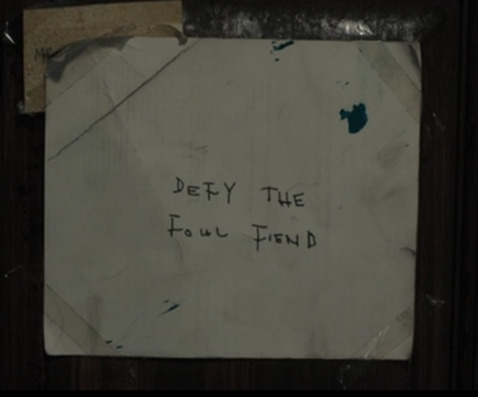
This calls to mind the phrase used by Aziraphale to refer to Crowly in episode 1. I’m not sure there’s anything in this as “foul fiend” has often been used to refer to demonic or evil beings. That said, it’s difficult not to try and make some connection, given that the two uses of the phrase are so close together in the show. We will later find out that Shadwell is working for both Aziraphale and Crowley for the same purpose, so defying the “foul fiend” in this case becomes somewhat impossible.
Quick pause for a moment of appreciation for that strut that David pulls off in this next scene. Honestly, there are professional supermodels that couldn’t manage that sort of casual arrogance, even if somebody told them they could stay thin and eat whatever they wanted for the rest of their lives.
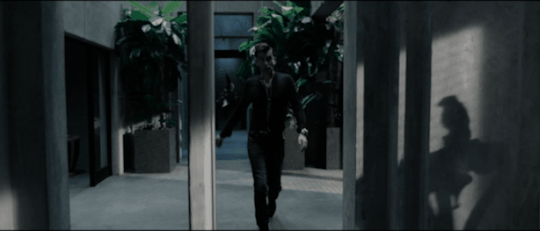
This is the first time we find out that Crowly has adopted a first name for himself. I’ll talk about it a little more in the write up(s) for episode 3, so for now this is another piece of information for us to store for later.
I quite enjoy just how awkward Aziraphale sounds leaving a message on the answerphone. Dealing with the unannounced arrival of two angels in his book shop he can handle, but having to leave a message instead of speaking to Crowley direct? Perish the thought. This seems to me a quite human attitude to have – when answerphones started to become commonplace, people (on the whole) hated leaving messages once they realised the person they wanted to speak to wasn’t going to pick up. What I find interesting about the conversation that they do have is that Aziraphale’s suggestion is actually incredibly obvious. In fact, it’s about the only possible scenario that would make any sense. Crowley’s disbelieving expression would suggest he doesn’t feel the same way:
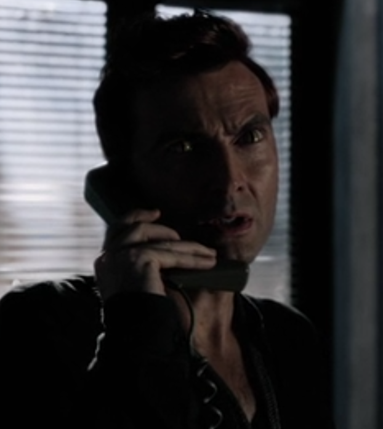
Still, at least this conversation tells the audience that this pair haven’t given up on working together to try and stop Armageddon just yet (it would be a pretty short and disappointing show if they had, wouldn’t it?!).
At this point in the episode, we are introduced to Crowley’s driving style which could be described as suicidal dangerous. He seems pretty confident with it though, so it’s unlikely this is out of the ordinary for him, urgency of their mission notwithstanding. Aziraphale doesn’t actually seem that bothered by it initially, not until we hear the horns of other angry drivers, where it becomes apparent that he’s actually very uncomfortable indeed. We’ll see a fair amount of material on the theme of Crowley’s driving and its effects on Aziraphale in this episode, almost like we’re being set up for something…
Crowley is pretty insistent on the use of “we” in this scene, despite the fact that Aziraphale really didn’t have anything to do with losing the Antichrist (he just took Crowley’s lead on this one). The angel doesn’t really dispute it though, though perhaps he’s just too worried about being discorporated to argue. What is pretty obvious is that Crowley does not appreciate being told how to drive, and it makes me wonder how many times they have had conversations exactly like this before.

I’m going to wrap this part up with a quick round-up of the “The Them” scenes in Tadfield, prior to the arrival Aziraphale and Crowley in the village. As with much of the other narrative-based scenes in this episode, I don’t have much to say about them, but I did make note of a couple of (potentially) interesting things:
Pepper’s middle name is Galadriel. For those people who have managed to live their lives without any sort of interaction with Lord of the Rings up to now, this is the name of an Elven queen in that universe. As much as it would be cool for there to be some sort of subtextual Clue hidden in her middle name, I think it’s more likely it was just picked because it was a fitting one for the daughter of a reformed hippy.
Anathema recites parts of an infamous speech from Shakespeare’s Macbeth here:
Eye of newt and […] tongue of dog.
What I find interesting about this is that there are two ingredients in the potion recipe that have been omitted (a frog’s toe and the wool of a bat), leaving only the two elements that can be found in the show – a Newt and a dog. Honestly, I’m not sure what to make of this, not least because I’m not even sure what relevance the rhyme has to what she’s doing at the time she recites it. Not to mention that she hasn’t actually met Newt at this point, so would have no knowledge of his name (to the best of our knowledge, he’s only referred to as “man” or “boy” in Agnes’s prophecies).
Wensleydale brings up the Spanish Inquisition when in the woods, which we know Crowley has claimed responsibility for (to his Hellish masters). I absolutely love the way that the religious reasoning for punishing people is so masterfully undermined by Brian’s earnest reasoning here. I should point out that in addition to being a hereditary Pagan, I am staunchly against organised religion (not faith; I consider that to be an entirely different concept and feel that it’s integral to the spiritual identity for pretty much everybody. I believe we should all have the right to follow our chosen faith without the overbearing interference of organised religion) so the satiric tones that people who were being executed would have been grateful for their persecution if they had understood the reasons behind it fully really strikes a chord with the religion-cynic in me.
There’s an interesting little set detail here in the Them’s den:
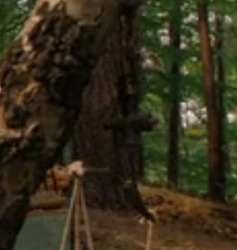
These look like old-school weighing scales to me. In the context of the conversation that the Them are having about torturing witches, these could be said to be a reference to the practice of weighing people accused of witchcraft against the weight of a bible to determine their guilt. Alternatively, it could be a reference to the scales we will see later in the series as the summoning object for Famine. Or it could be nothing. I doubt that last one though.
That brings us quite nicely to see Aziraphale and Crowley arriving in Tadfield, which feels to me like a good place to finish this part of the write up. I’m going to be tackling a couple of important moments in the next part (can we say “wall slam”?), which I’m aware have been discussed at length already, but I have things to say and I’m going to say them. They’ve probably all been said before, but they need to get out of my head and into a piece of writing so I’m going to say them anyway. Questions, comments and discussion on this part welcome as always!
#good omens#good omens season 1#episode analysis#aziracrow#ineffable idiots#ineffable husbands#anathema device#newton pulsifer#sergeant shadwell#easter eggs#crowley#aziraphale#crowley's houseplants#crowley's driving#the them#good omens pepper#good omens brian#good omens wensleydale#tadfield
21 notes
·
View notes